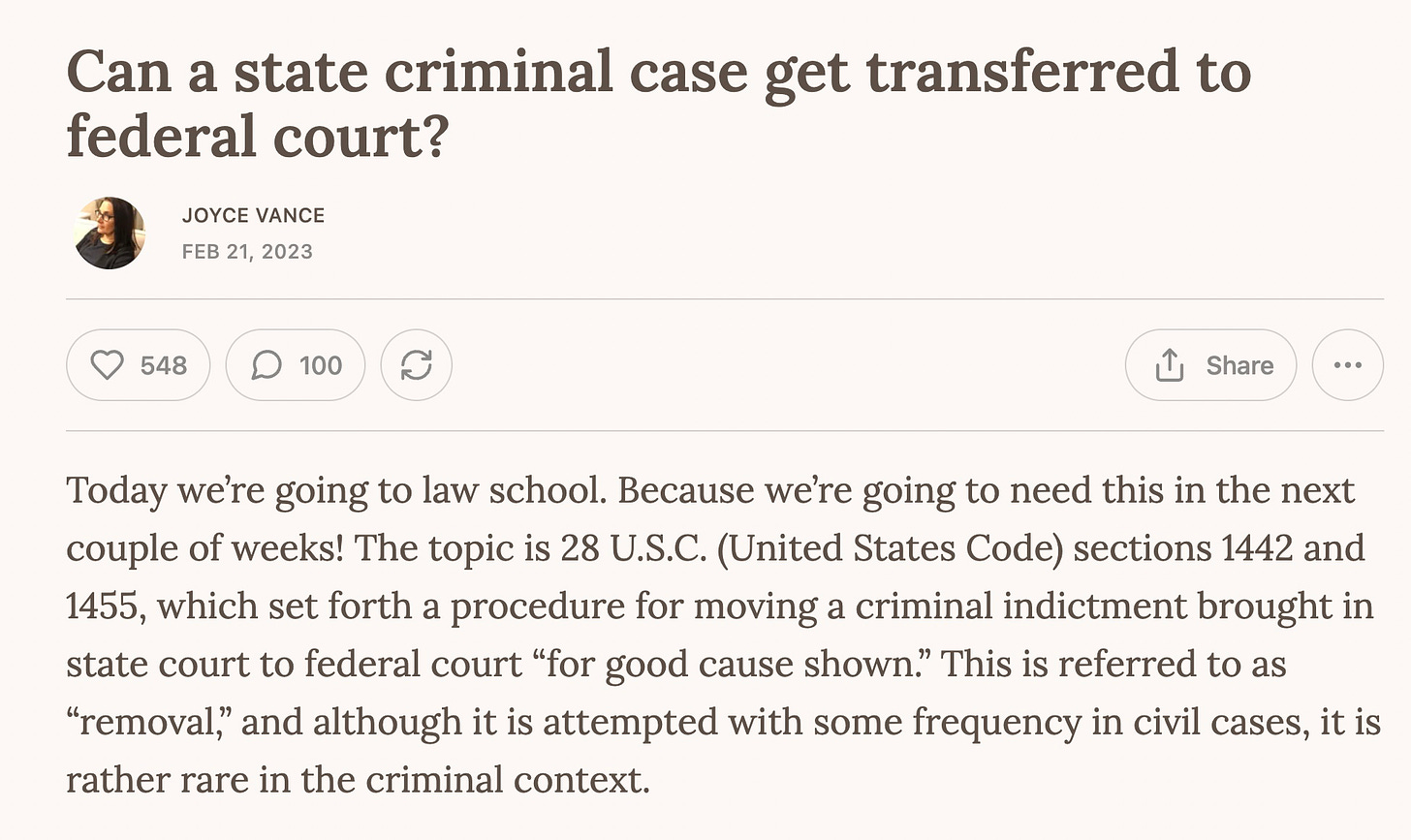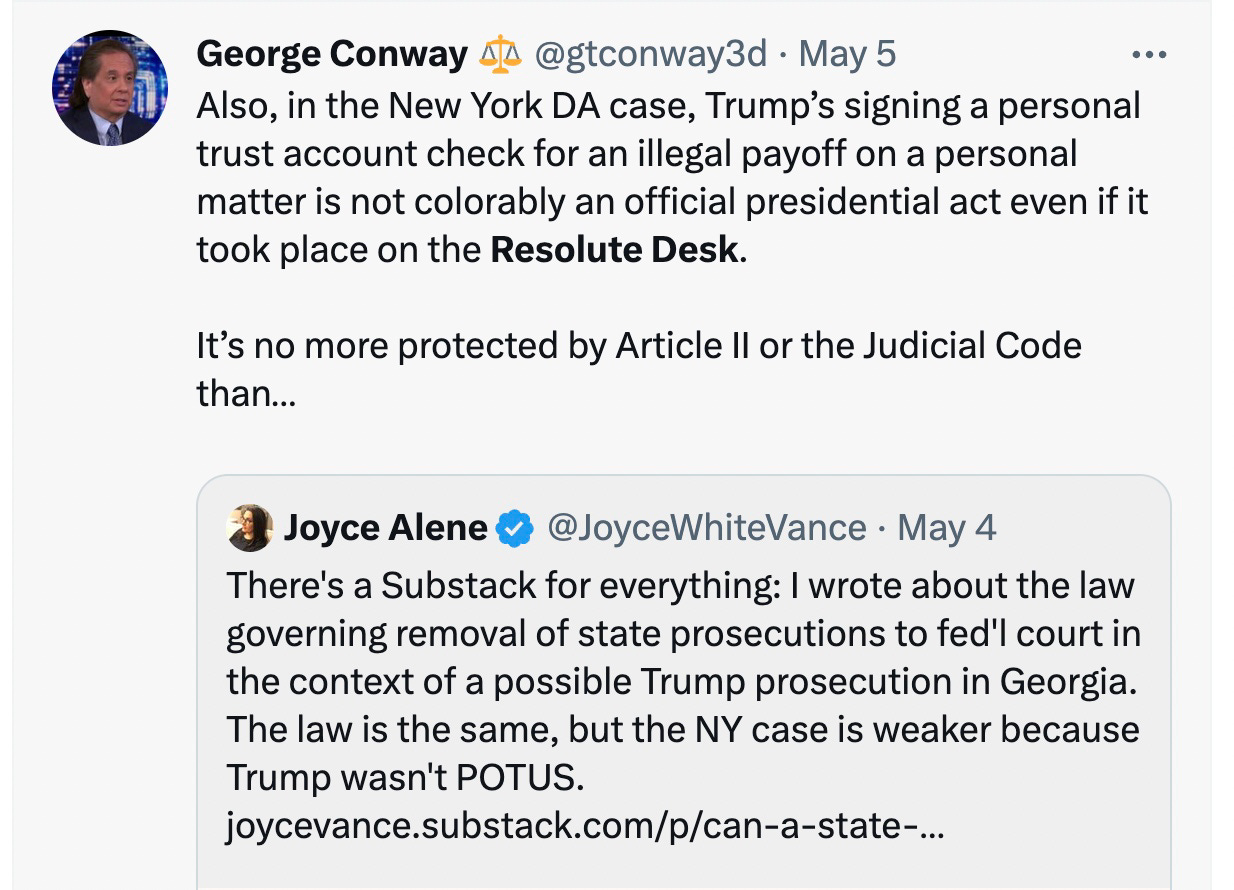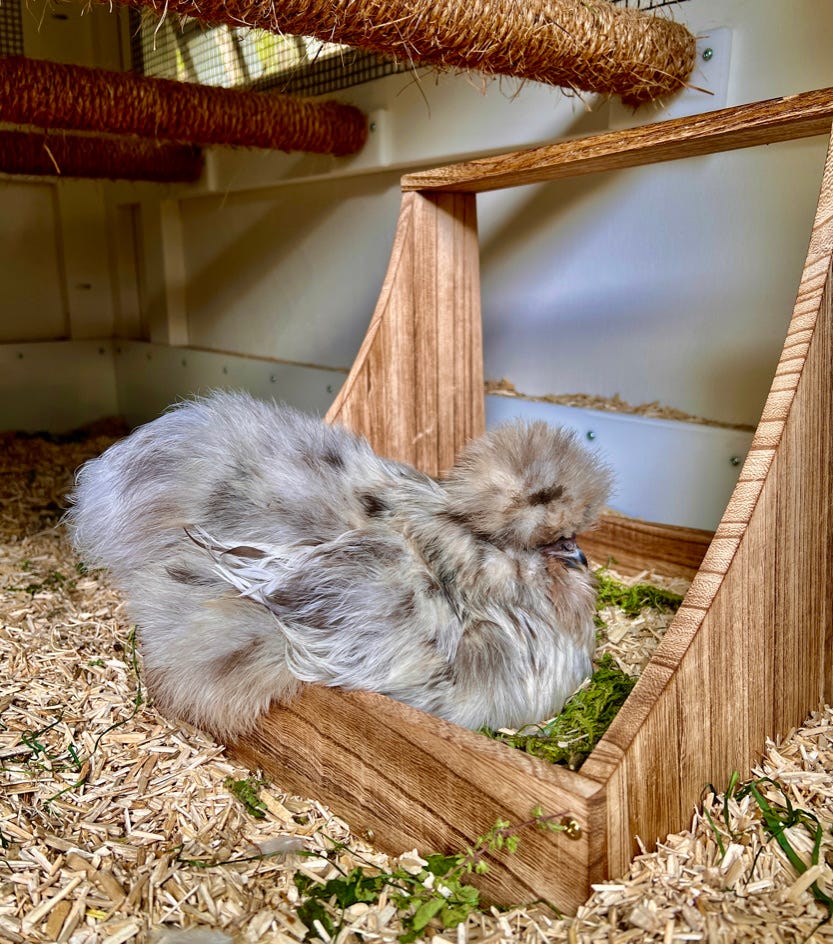In addition to Trump’s proclamation that he intends to shred democracy if reelected (see yesterday’s edition of the newsletter if this isn’t ringing a bell), there’s a lot more in play this week.
First, the closing arguments in E. Jean Carroll’s defamation and battery case against Donald Trump happened on Monday. Tuesday morning, the judge will instruct the jury on the law, and then their deliberations will begin. Soon we’ll know the outcome of this trial, which has been a long time in the making. The evidence against Trump seems compelling (and of course, I know E. Jean, so perhaps I’m biased), but juries, who have the opportunity to focus on every moment of a trial and view the witnesses’ demeanor first-hand, can do interesting things. Now we wait, the worst part of every trial.
The jury’s verdict has to be unanimous even though this is a civil case—federal court rules. You’ll recall that the case being tried is what’s referred to as Carroll II; it involves a 2022 defamation and a battery claim under New York’s Adult Survivors Act for the alleged rape. It was filed in federal court because Trump had already moved to Florida at the time it was filed. Had he still been a New York resident, she would have filed in state court. Carroll I, the earlier case that involved an alleged defamation while Trump was president, was filed in New York state court but removed to federal court by then-Attorney General Bill Barr, who argued DOJ was entitled to represent Trump in federal court. By the time Carroll filed her second case, Trump was already a Florida resident. That meant Carroll was able to file the second case directly in federal court under “diversity jurisdiction,” because the parties are residents of two different states.
That turned out to be an important move strategically because the two cases were deemed related and assigned to the same judge, who has been scrupulously fair but who has also declined to give Trump an inch that wouldn’t have been given to any other litigant, including calling Trump’s bluff about wanting to testify after his lawyers had concluded his case.
But it does mean every juror must agree before they can return a verdict for Carroll on each of the two separate charges in the complaint. If they do that, then they’ll have to hammer out how much to award her in damages—that part could take more than a minute, especially because Carroll didn’t ask for a specific number for punitive damages or on the battery claim. In closing argument, her lawyer said that for E. Jean Carroll, the lawsuit wasn’t about the money. It was, she said, about getting her “name back.” We’ll find out if the jury agrees she’s entitled to that.
Speaking of removing cases from state court to federal court, Trump has filed a motion to have his New York state prosecution removed to federal court. Can he do that?
If you’ve been a Civil Discourse subscriber for a while, you may remember that I wrote about this sort of “federal removal” procedure in the context of a possible Georgia prosecution several months back. Take a look here if you want a refresher.
Trump’s argument will be weak if he makes it in Georgia, and it’s even weaker in New York because he was absolutely not acting within the scope of his position as the president when he signed the hush-money payment to Stormy Daniels. George Conway explains it succinctly in this tweet:
The fate of Trump’s request will be up to a federal judge in Manhattan. We may even see some movement this week once Manhattan DA Alvin Bragg files a response. I’d expect the court to treat the request seriously, as befits the situation. But while there might be arguments that it makes more sense to prosecute a former president in federal court than in state court, it’s hard to see how that’s warranted on the basis of this specific statutory provision.
Back in state court, Judge Juan Merchan asked prosecutors and Trump’s team to agree to a trial date in February or March 2024. In other words, smack-dab in the middle of primary season. The judge told the parties that, once set, the date will be firm and “no one” involved should schedule anything that could interfere. “He cannot agree to any speaking engagements, appearances,” Judge Merchan said.
Absent any additional delays, former Manhattan DA Mark Pomerantz will testify in a closed-door session before Jim Jordan’s House Judiciary Committee, which is desperately trying to develop evidence that the prosecution of Trump is a witch hunt. Despite being called to testify and his publication of a book when he left the DA’s office, Pomerantz is no fan of Trump’s. He may have some grievances of his own with the former president to air when he testifies, since he left because he was unhappy with new DA Bragg’s decision that he would not indict charges related to allegations of fraud committed by the Trump Org.
This week we may also get more news about an intriguing report in an NYT article late last week that suggests DOJ has an inside cooperator in the Mar-a-Lago investigation. “The existence of an insider witness, whose identity has not been disclosed, could be a significant step in the investigation.” The reporting suggests that the witness’s cooperation is focused on whether Trump tried to obstruct the investigation by hiding classified items in his possession after DOJ served him with a subpoena. The focus, if the reporting is accurate, is squarely on Trump personally, seeking to “determine whether Mr. Trump ordered boxes containing sensitive material moved out of a storage room.”
The previously undisclosed existence of a cooperator might explain why DOJ has focused on obtaining testimony from virtually everyone who works for Trump at Mar-a-Lago, including people in what the Times called “fairly obscure jobs.” If DOJ has at least a partial picture of possible efforts to hide items by Trump, they will seek to learn as much as they can about movements, security, and who saw what. But the security cameras seem to be a focus, with both Matthew Calamari Sr., who ran security before becoming Trump’s chief operating officer, and his son, Matthew Calamari Jr., who directs corporate security, receiving subpoenas. You get the sense that special counsel Jack Smith is a leave-no-stone-unturned kind of guy when it comes to assembling evidence for what would be the first-ever federal prosecution of a former president.
Of course, Smith will need approval from DOJ before he indicts, and while he’s likely to receive it if that’s what he recommends—the evidence we know about publicly looks strong, and Garland has said his preference is to respect recommendations from prosecutors working a case—there will be lots of stakeholders with equities that have to be considered before the Attorney General signs off. For instance, the intelligence community will be concerned about releasing sensitive material as evidence. Those issues can take time to sort out, but it’s critical for prosecutors to know what evidence will be available to them before they indict. As a wise prosecutor once said to me, you can go fast alone or far together. Prosecutors need to be able to go the distance here, which may slow down the decision-making process, which has already seemed frustrating slow. While I don’t think we’ll see indictments this week, we might expect a little noise around final grand jury meetings when prosecutors seek an indictment and perhaps some final witnesses appear. But, to be fair, we’re at the point where we honestly don’t know what the timeline is like. If DOJ is going to indict, and I strongly suspect they will, that could happen at any time now.
In other exciting news, Miss Penelope has decided it’s that time of year, and she’s ready to hatch some baby chicks.
So I’ve set her up with a nice, comfy nesting box full of sweet-smelling herbs and tucked some of Pickles’s pretty blue eggs under her. Just between us, I’m not at all sure our rooster, Scotch, is quite up to it, and these eggs may be non-starters. But even the possibility of having a few new babies is enticing.
Pickles, meanwhile, has been having fun checking out the new dust bath I’ve made for them and doesn’t seem to be concerned at all with the fate of her possible babies. We’re in for a crazy few months. I hope, like me, you’ll grab a little fun wherever you can find it.
We’re in this together,
Joyce









The law, cold molasses slow... guess I have to wish 45 good health if I want him to live long enough to have a prison buzz cut.
Joyce, you are such an interesting person-a true Renaissance woman in Alabama! It’s a privilege to be able to learn from and about you. Thank you.